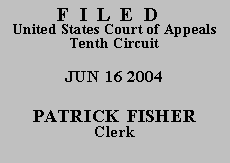

| PETER WASKO,
Plaintiff-Appellant, Defendant-Appellee. |
No. 03-2204
(D.C. No. CIV-03-794-WJ/RHS) |
The district court aptly set forth the basic facts and allegations underlying Mr. Wasko's complaint:
Plaintiff's Complaint alleges that Defendant was his attorney in an age discrimination in employment case against the State of New Mexico Environment Department. Plaintiff contends that Defendant committed malpractice with regard to his representation of Plaintiff on the employment claim. Defendant's alleged acts of malpractice include lack of diligence and promptness with regard to Plaintiff's case, and a failure to communicate with Plaintiff. Plaintiff filed a malpractice claim against defendant in state court which is still pending. Plaintiff's Complaint in this case asserts that Defendant has continued to commit acts of malpractice during the pendency of the state malpractice case by failing to timely file an answer to the state malpractice complaint, falsely representing to the state court that he was not properly served, failing to file responses to various pleadings, and failing to appear at a pre-trial conference. Plaintiff's Complaint alleges that these various acts by Defendant violated Plaintiff's rights to due process and equal protection under the Fourteenth Amendment of the Constitution of the United States and under Article III Section 18 of the Constitution of the State of New Mexico.
Wasko v. Silverberg, No. CIV-03-794 at 1-2.
As mandated by the Fourteenth Amendment: "No state shall . . . deprive any person of life, liberty, or property, without due process of law; nor deny to any person . . . the equal protection of the laws." U.S. Const. amend. XIV, § 1 (emphasis added). The rights guaranteed by this section are actionable in federal court pursuant to 42 U.S.C. § 1983:
Every person who, under color of any statute, ordinance, regulation, custom, or usage, of any State . . . subjects, or causes to be subjected, any citizen of the United States . . . to the deprivation of any rights privileges, or immunities secured by the Constitution and laws, shall be liable to the party injured in an action at law, suit in equity, or other proper proceeding for redress . . . .
Id. (emphasis supplied). A violation of either the Fourteenth Amendment or § 1983 requires wrongs committed by a state actor. Regardless of the character of the particular rights asserted, if there is no state actor, there will be no federal cause of action.
Mr. Wasko failed to present any evidence that Mr. Silverberg is state actor, so he cannot succeed on a claim under the Fourteenth Amendment or § 1983. Mr. Silverberg was clearly not acting on behalf of the state when he was representing Mr. Wasko in the state court proceedings nor when he allegedly failed to respond properly to Mr. Wasko's state court malpractice action.
Mr. Wasko's remaining claim arises under the Constitution of the State of New Mexico. Mr. Wasko asks us to review his state law claim under our "pendent claim jurisdiction," Aplt. Br. at 2, but given our disposition of his federal claims, pendent jurisdiction does not exist. As we explained in Sullivan v. Scoular Grain Co. of Utah, 930 F.2d 798, 803 (10th Cir. 1991), we may exercise pendant jurisdiction only where "the federal claim [has] substance sufficient to confer subject matter jurisdiction on the court." Id. (quoting United Mine Workers v. Gibbs, 383 U.S. 715, 725 (1966)). Mr. Wasko's claims lack this required substance, and thus are not appropriate for federal review.
For the foregoing reasons, we AFFIRM the district court's dismissal of Mr. Wakso's complaint.
ENTERED FOR THE COURT
Stephanie K. Seymour
Circuit Judge
*.After examining appellant's brief and the appellate record, this panel has determined unanimously that oral argument would not materially assist the determination of this appeal. See Fed. R. App. P. 34(a)(2) and 10th Cir. R. 34.1(G). The case is therefore submitted without oral argument. This order and judgment is not binding precedent, except under the doctrines of law of the case, res judicata, or collateral estoppel. The court generally disfavors the citation of orders and judgments; nevertheless, an order and judgment may be cited under the terms and conditions of 10th Cir. R. 36.3.